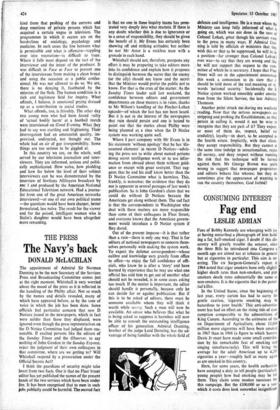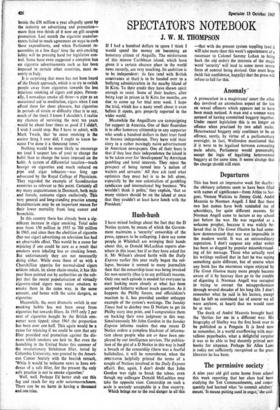Fag end
CONSUMING INTEREST LESLIE ADRIAN
Foes of Bobby Kennedy are whooping with joy at having unearthed a photograph of him hold- ing a fat, half-smoked cigar. I doubt if this dis- covery will greatly trouble the senator, since the three Bills he introduced into Congress a month ago are aimed not at tobacco in general but at cigarettes in particular. This aim is un- erring. The us Surgeon-General's report in 1964 noted that cigar smokers have only slightly higher death rates than non-smokers, and pipe smokers death rates substantially the same as non-smokers. It is the cigarette that is the poten- tial killer.
In the United States, since the beginning of last year, every carton has had to carry the gentle caution, 'cigarette smoking may be hazardous to your health.' This anti-advertise- ment has had an effect on the rising tide of con- sumption comparable to the admonitions of King Canute. According to the estimates of the us Department of Agriculture, about 11,000 million more cigarettes will have been smoked in 1967 than in 1966 (a figure to which Sammy Davis Jr must have made some small contribu- tion by his remarkable feat of smoking and singing simultaneously). This will bring the average for the adult American up to 4,295 cigarettes a year—roughly half as many again as are smoked in this country.
Here, for some years, the health authorities have accepted a duty to tell people (particularly young people) how bad smoking may be for them. They claim some modest successes for this campaign. But the £100,000 or so a year which it costs does look somewhat insignificant beside the £36 million a year allegedly spent by the industry on advertising and promotion— more than two thirds of it now on gift coupon promotion. Last month the cigarette manufac- turers failed to reach agreement on ways to curb these expenditures, and when Parliament re- assembles in a few days' time the anti-smoking lobby will be pressing hard for legislative con- trol. Some have even suggested a complete ban on cigarette advertisements such as has been imposed in certain other countries, most re- cently in Italy.
It is surprising that more has not been heard of the Dutch approach, which is to try to switch people away from cigarettes towards the less injurious smoking of cigars and pipes. Person- ally, I nowadays smoke all three—a pipe as an occasional aid to meditation, cigars when I can afford them for sheer pleasure, but cigarettes in periods of strain or difficulty (that is to say, much of the time). I know I shouldn't. I realise my chances of surviving the next ten years , would be about four times as good if I didn't. I wish I could stop. But I have to admit, with Mark Twain, that 'to cease smoking is the easiest thing I ever did; I ought to know be- cause I've done it a thousand times.'
Nothing would be more likely to encourage me (and I suspect lots of you) to change the habit than to change the taxes imposed on the habit. A system of differential taxation—much heavjer on cigarettes and much reduced on pipe and cigar tobaccos—was long ago advocated by the Royal College of Physicians. They regarded the example of Scandinavian countries as relevant to this point. Certainly all my many acquaintances in Denmark, both male and female, consume cigars exclusively. This very general and long-standing practice among Scandinavians may be an important reason for their lower mortality from lung cancer and bronchitis.
In this country there has already been a sig- nificant increase in cigar smoking. Total sales rose from 150 million in 1955 to 700 million in 1965, and since then the abolition of cigarette (but not cigar) advertising on television has had an observable effect. This would be a cause for rejoicing if one could be sure as a result that smokers were inhaling less or smoking fewer. But unfortunately they are not necessarily doing either. While even those of us with a Churchillian appetite for normal-sized cigars seldom inhale, let alone chain-smoke, it has this year been pointed out by authorities on the sub- ject that the recent popularisation of virtually cigarette-sized cigars may cause smokers to smoke them in the same way, in the same amount, and hence with the same dangers, as cigarettes.
Meanwhile, the most dramatic switch in our smoking habits has not been away from cigarettes but towards filters. In 1955 only 2 per cent of cigarettes bought by the British con- sumer were tipped; since 1965 the proportion has been over one half. This again would be a cause for rejoicing if we could be sure that any filter provided real protection against the dis- eases which smokers are heir to. But even the launching in the United States this summer of the revolutionary Strickman filter, tested by Columbia University, was greeted by the Ameri- can Cancer Society with the bearish remark, 'While it would be welcome news to have evi- dence of a safe filter, for the present the only safe practice is not to smoke cigarettes.'
Well, well. Perhaps I'd better stub out this fag and reach for my echt naturmeerschaum. There can be no harm in having a thousand and one tries.



































 Previous page
Previous page